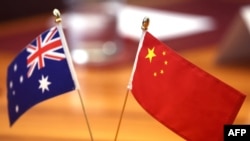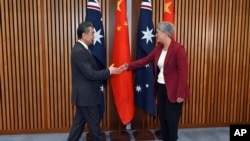China said it may propose talks on maritime issues with Australia amid ongoing tensions in the South China Sea.
Following Chinese Foreign Minister Wang Yi’s trip to Australia last week — during which he exchanged views on trade, consular affairs, and regional security with Australian Prime Minister Anthony Albanese and Australian Foreign Minister Penny Wong — the Chinese Foreign Ministry said on March 21 that Beijing is actively considering “launching a dialogue on maritime affairs” with Australia.
In response to Beijing’s proposal, Australia’s Foreign Affairs and Trade Department told VOA in a written response that Wang and Wong exchanged views on maritime safety and security during their meeting on March 20, adding that Canberra will “consider the most practical and useful format for dialogue on maritime issues.”
The announcement comes amid efforts from Beijing and Canberra to improve bilateral relations after China imposed sanctions worth $12.7 billion on Australian products, most of which have been lifted in recent months.
While China and Australia have agreed on stabilizing trade relations, regional security remains a sensitive issue between the two countries. Following her meeting with Wang, Australia’s Wong told journalists that she reiterated Canberra’s “serious concern” about unsafe conduct at sea.
“I reflected the view of our region as outlined again and underscored again at the recent ASEAN summit about the importance of the South China Sea being governed by international law, particularly UNCLOS [the U.N. Convention on the Law of the Sea],” she said during a press conference on March 20.
Some analysts say Australia and China could both benefit from a bilateral dialogue over maritime issues. While Australia needs to avoid being viewed as endorsing China’s approach in the South China Sea, “the way to work on de-escalating incidents in the maritime domain is to have open communication,” Jennifer Parker, an expert associate at the Australian National University, told VOA by phone.
Other experts say Australia should handle Beijing’s proposal with caution.
“Beijing’s motive is to include the maritime affairs dialogue on the bilateral track with Canberra, and China is likely hoping to move Australian public discussion of the South China Sea and other maritime issues as far as possible,” Euan Graham, a senior analyst at the Australian Strategic Policy Institute, told VOA by phone.
Since the Albanese administration has been “heavily invested” in improving ties with China, Graham thinks Canberra will “find it hard to decline” Beijing’s proposal.
Instead of keeping the dialogue in a bilateral format, some analysts say Australia will try to “multi-lateralize” the format and involve other countries.
“Once [Australia] multi-lateralizes the format, they move [the dialogue] away from the asymmetry that’s inherent in the Australia-China relationship, and they create more breaks on what the Chinese can do,” Stephen Nagy, a regional security expert at the International Christian University in Japan, told VOA by phone.
Despite China’s willingness to discuss maritime issues with Australia, Graham said it’s unlikely Beijing will change its posture in the South China Sea, where Chinese coast guard vessels have repeatedly engaged in confrontation with Philippine vessels.
“Beijing is not going to change its positions [in the South China Sea] because it has been trying to get broader regional acceptance of its version of the law of the sea and maritime claims,” he told VOA.
Parker said that a maritime affairs dialogue between China and Australia could at least help de-escalate regional tensions. “I think a dialogue between Australia and China on maritime affairs may assist in a mechanism to de-escalate incidents once they occur,” she told VOA.
Rising tension
Tension flared up again between Beijing and Manila in the South China Sea over the weekend. The Philippine government said Chinese coast guard ships sprayed a Philippine vessel conducting a resupply mission to the Second Thomas Shoal with water cannons on Saturday.
The incident is the latest episode in the ongoing confrontation between Chinese and Philippine vessels in the region. Beijing has urged Manila to “stop its infringement and confrontation” in the disputed waters, while the Philippine government vowed to exercise its legal rights over its maritime zones.
In response to the heightened tensions, Australia has strengthened partnerships with Southeast Asian countries in recent months, conducting patrols with the Philippines in the region last year and upgrading bilateral relations with Vietnam earlier this month.
As Beijing maintains its aggressive posture in the South China Sea, some experts say it will be difficult for China to convince Australia to change its stance on regional maritime security issues.
“Beijing has increased its aggression and that’s not going to make it easy for Australia to take a neutral stance,” Ray Powell, director of Stanford University's Gordian Knot Center, told VOA by phone.
While Australia doesn’t have enough capacity to independently influence the South China Sea dynamics, Graham said Canberra could be “an effective balancer” in the region.
“Australia can shift the dial over the long-term struggle with Beijing by developing a sophisticated division of labor with other countries in the region, including the U.S., Japan, India, and Southeast Asian countries that are willing to work with Canberra,” he told VOA.







